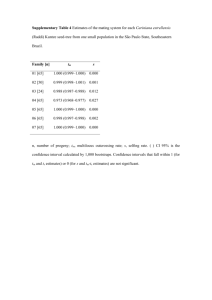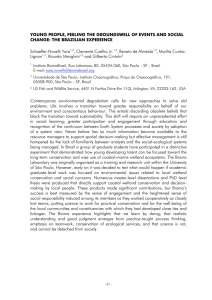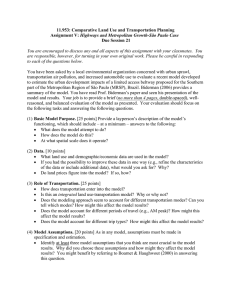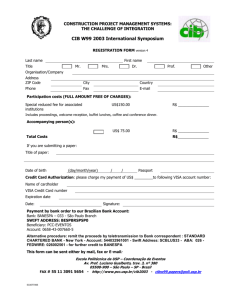IFCS Indicators of Progress Priorities for Action beyond 2000 and
advertisement
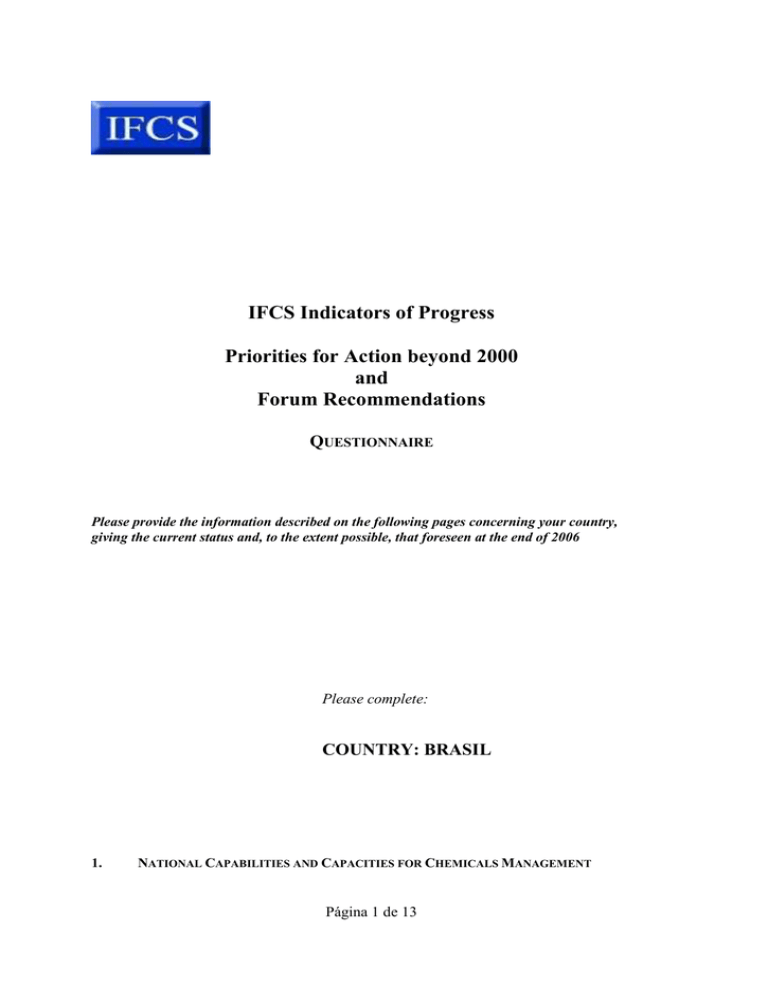
IFCS Indicators of Progress Priorities for Action beyond 2000 and Forum Recommendations QUESTIONNAIRE Please provide the information described on the following pages concerning your country, giving the current status and, to the extent possible, that foreseen at the end of 2006 Please complete: COUNTRY: BRASIL 1. NATIONAL CAPABILITIES AND CAPACITIES FOR CHEMICALS MANAGEMENT Página 1 de 13 Priorities for Action E1 and E21 1a) Has a comprehensive National Chemicals Management Profile, or other equivalent strategic national plan, been developed through a multi-stakeholder process2? National Profile Other equivalent strategic national plan Yes X Yes No No If "Yes" to either of the above, please indicate the original publication date and the date(s) of any revisions. Brazilian Chemical Management Profile. Publication date: September/2003. No revision since that. If "Yes" to either of the above, please list all ministries, agencies and organizations that participated: Ministry of the Environment - MMA Brazilian Institute for the Environment and Renewable Resources - IBAMA Ministry of Health – MS Secretariat of Health Surveillance – SVS Brazilian Sanitary Surveillance Agency – ANVISA Oswaldo Cruz Foundation – FIOCRUZ Ministry of Agriculture, Livestock and Supply – MAPA Ministry of Science and Technology – MCT Ministry of National Integration – MI Ministry of Mines and Energy – MME Ministry of Foreign Affairs – MRE Ministry of Development, Industry and Foreign Trade – MDIC Ministry of Labour and Employment – MTE Jorge Duprat Figueiredo Foundation for Workers' Safety and Occupational Medicine – FUNDACENTRO Ministry of Transport – MT Brazilian Land Transport Agengy – ANTT Brazilian Association of State Environmental Entities – ABEMA Brazilian Chemical Industry Association – ABIQUIM Workers' Central Trades Union – CUT Brazilian Forum of Non-Governmental Organizations and Social Movements for the Environment and Development – FBOMS University of Brasília – UnB University of São Paulo – USP Pan American Health Organization - PAHO If "No", is your country in the process of developing or planning on developing a 1 The Priorities for Action Beyond 2000 may be viewed on the IFCS website at www.ifcs.ch. A multi-stakeholder process is a process involving all concerned national ministries and other government institutions, as well as other interested national parties. 2 25 Comprehensive National Chemicals Management Profile? Yes Expected completion date ___________ No If "No", have equivalent measures such as a government investigation on chemical safety followed by legislative measures been undertaken? Yes No If "Yes", please describe: _________________________________________________________ _________________________________________________________ _________________________________________________________ 1b) Has your country developed any of the following on the sound management of chemicals? If yes, please provide year completed. If development is in progress, please provide the expected completion year? No National Policies National Priorities Yes (since 2001) National Strategies yes (since 2001) National Action Plans yes (since 2001) 1c) Has your country established an inter-ministerial/intersectoral coordinating mechanism (e.g. committee or body) to facilitate the comprehensive treatment of chemical safety issues? Yes X No If "Yes": What is the name of the "mechanism"? National Comission on Chemical Safety - CONASQ When was it established? December/2000 2. CLASSIFICATION AND LABELLING OF CHEMICALS Priority for Action B1 2a) Has your country initiated work to adopt and implement the Globally Harmonized System for Classification and Labelling of Chemicals (GHS)? Yes X No 35 If "Yes", what is the expected date (year) GHS will be fully operational? 2008 2b) Has your country ratified and implemented ILO Convention 170 on Safety in the Use of Chemicals at Work3, or instituted comparable measures? Yes X 3. No NATIONAL ARRANGEMENTS FOR EXCHANGE OF INFORMATION ON HAZARDOUS CHEMICALS Priority for Action C1 3a) What arrangements are operational in your country for the exchange of information on hazardous chemicals? Please describe. Brazil has many Banks of Data, related to chemicals: among others: SIA – Pesticide Information System (http://www.anvisa.gov.br); AGROFIT – System of Pesticides (http://www.agricultura.gov.br) Wood preservatives (http://www.ibama.gov.br/) SINITOX – National System of Toxicological Information (http://www.fiocruz.br/sinitox) Please indicate if the established infrastructure includes: 1) website where national partners can gain access to chemical information sources, Yes X No 2) institutional directory listing sources of information Yes 4. No X NATIONAL PROCEDURES ON SAFETY INFORMATION FOR HAZARDOUS MATERIALS IN CIRCULATION Priority for Action C3 4a) Does your country have procedures in place to ensure that any hazardous material put into circulation is accompanied, at a minimum, by appropriate and reliable safety information that is easy to access, read and understand? Yes X No If "Yes": Are the procedures consistent with the safety data sheets of the 1990 International Labour Organization Chemicals Convention (No.170)? Yes X No 3 ILO Convention 170 may be viewed on the ILO website at: http://www.ilo.org/ilolex/english/convdisp1.htm 45 Do they conform to the Globally Harmonized System for the Classification and Labelling Of Chemicals? Yes X 5. No ECOLOGICALLY SOUND AND INTEGRATED STRATEGIES FOR PEST MANAGEMENT Priority for Action D1 5a) Yes X Has your country prepared integrated pest management strategies? No If "Yes", were national studies done to develop the strategies? Yes X 6. No OBSOLETE STOCKS OF PESTICIDES AND OTHER CHEMICALS Priority for Action D2 6a) Are there any obsolete stocks of pesticides and/or other chemicals in your country? Yes X No 6b) Has your country prepared an action plan for disposal of obsolete stocks of pesticides and other chemicals? Yes X No If "Yes", has the action plan been implemented? Yes No X If "Yes", has the action plan been completed? Yes No X If "No", is work in progress to prepare an action plan? Yes X If yes, what is the expected completion date (year)? 2007 No 7. If no, why not? _________________________________________ NATIONAL SYSTEMS FOR PREVENTION OF MAJOR INDUSTRIAL ACCIDENTS AND EMERGENCY PREPAREDNESS & RESPONSE Priority for Action D4 55 7a) Has your country implemented a national system for emergency preparedness and response, in accordance with international principles4? Yes X No If "No", is work in progress to implement the system? Yes expected completion date (year)? In implementation process since 2004 7b) Is there a national law requiring the system? Yes X No 7c) Has your country ratified and implemented ILO Convention 1745 on Prevention of Major Industrial Accidents? Yes X No If "No", are efforts under way to do so? Yes 8. No INTERNATIONAL CODE OF CONDUCT ON THE DISTRIBUTION AND USE OF PESTICIDES 8a) Has your government implement the revised International Code of Conduct on the Distribution and Use of Pesticides (November 2002)6 as the basis for a comprehensive life cycle approach to pesticide management ? Yes X No If "No", are efforts under way to do so? Yes No 8b) Have the provisions of the Code of Conduct been implemented through other pieces of legislation or by other means? Yes X No If "Yes", please briefly describe. Brazil has legislation for pesticides, since 1989. This legislation is implemented. ______________________________________________________________ 4 Ref. OECD Second Edition 2003 Guiding Principles for Chemical Accident Prevention, Preparedness and Response, undertaken in cooperation with other international organizations, including ILO, IMO, UNECE, UNEP, UNOCHA (UNEP/OCHA Joint Environment Unit) and WHO. 5 ILO Convention 170 may be viewed on the ILO website at: http://www.ilo.org/ilolex/english/convdisp1.htm 6 The International Code of Conduct on the Distribution and Use of Pesticides may be viewed at: http://www.fao.org/AG/AGP/AGPP/Pesticid/ 65 ______________________________________________________________ 9. POISON CENTRES Priority for Action D7 9a) Yes X Have poison centre(s) been established in your country? No If "Yes", please indicate classification level for each poison centre: WHO Status of Development Classification well-established centres, the full range of clinical analytical and other relevant facilities A and cover the whole country. well-established centres, but lack some of the related facilities or do not provide full B coverage to the country. These centres require further development in order to meet the ideal criteria for centres given in the IPCS Guidelines certain facilities for poison control, but require major support to develop further areas C of activities, according to the criteria in the IPCS Guidelines, and should expand coverage through the country. Centre (Name & location: City/State) CCI – Aracaju/Sergipe CIT – Belém/Pará SERVITOX – Belo Horizonte/Minas Gerais CEATOX – Botucatu/São Paulo CIAT – Brasília/Distrito Federal CEATOX – Campina Grande/Paraíba CCI – Campinas/São Paulo CIVITOX – Campo Grande/Mato Grosso do Sul CIAT – Cascavel/Paraná CIAVE – Cuiabá/Mato Grosso CIT – Curitiba/Paraná CIT – Florianópolis/Santa Catarina CEATOX – Fortaleza/Ceará CIT – Goiânia/Goiás HVB (Hosp. Vital Brasil) – São Paulo/São Paulo CCI – Jabaquara/São Paulo CEATOX (Hosp. das Clínicas) – São Paulo/São Paulo CEATOX – João Pessoa/Paraíba CCI – Londrina/Paraná CIAT – Manaus/Amazonas CEATOX – Marília/São Paulo Date Established 75 Classification initial Classification - 2000 Classificatio n - current CCI – Maringá/Paraná CIT – Natal/Rio Grande do Norte CCI – Niterói/Rio de Janeiro CIT – Porto Alegre/Rio Grande do Sul CEATOX – Presidente Prudente/São Paulo CEATOX: Recife/Pernambuco CCI - Ribeirão Preto/São Paulo CIAT - Rio Branco/Acre CCI – Rio de Janeiro/Rio de Janeiro CIAVE – Salvador/Bahia CCI – Santos/São Paulo CEATOX – São José do Rio Preto/São Paulo CCI – São José dos Campos/São Paulo CCI – Taubaté/São Paulo CIAT – Teresina/Piauí TOXCEN – Vitória/Espírito Santo Glossary: CAT: CENTER OF AID TOXICOLÓGICAL. CCE: CONTROL CENTER OF POISONINGS CCI: CONTROL CENTER OF POISONINGS CCIn: CONTROL CENTER OF POISONINGS CEATOX: CONTROL CENTER OF POISONINGS CIAT: CENTER OF INFORMATION AND AID TOXICOLÓGICAL. CIAVE: CENTER OF INFORMATION AGAINST POISON CIT: CENTER OF INFORMATION TOXICOLÓGICAL. CITF: CENTER OF TOXICOLOGICAL AND FARMACOLOGICAL INFORMATION CIVITOX: INTEGRATED CENTER OF THE SUPERVISION OF TOXICOLOGY SERVITOX: SERVICE OF TOXICOLOGY. TOXCEN: CENTER OF ATTENTION TOXICOLÓGICAL HVB: VITAL BRAZIL HOSPITAL 9b) Is strengthening of poison centers planned? Yes If "Yes", for what time period? Brazil has a permanent plan for strengthening this Centers. 9c) If there are no established poison centres in your country, is work under way in your country to establish a poison control centre with related chemical and analytical facilities for the first time? Yes No If "Yes" when do you expect the poison control centre to be operational? Please provide location and date (year). 10. POLLUTANT RELEASE AND TRANSFER REGISTERS/EMISSION INVENTORIES 85 Priority for Action D8 10a) Has your country established: An air emission inventory? Yes X No A land emission inventory? Yes No X A water emission inventory? Yes X No A waste inventory? Yes X No A Pollutant Release and Transfer Register (PRTR)? Yes No X If "No", is work being initiated to design a PRTR or emission inventory system? Yes X 10 b) the Has your country implemented a system comparable to the PRTR (e.g. Integrated Pollution Prevention and Control)? Yes X 11. No No PREVENTION OF ILLEGAL TRAFFIC IN TOXIC & DANGEROUS PRODUCTS Priority for Action F 11a) Has your country developed a national strategy, or other national measures (e.g. legislation, action plans) for the prevention of illegal traffic in toxic and dangerous products? Yes X No If "Yes", when was it prepared? The strategies for this issues is a permanent action of Ministry of Justice 12. Children and Chemical Safety (Forum IV Recommendation) 12a) Has your government prepared, through multi-stakeholder 95 consultation, initial national assessments of children’s environmental health and chemical safety? Yes X No If "No", are efforts under way to do so? Yes No 12b) Has your government taken action to promote harmonized data collection, research, legislation and regulations, and the use of indicators of children’s environmental health? Yes X No If "Yes", please briefly describe: If "No", are efforts under way to do so? Yes No 13. HAZARD DATA GENERATION (Forum IV Recommendation) 13a) Has your government established national priorities for information generation for chemicals that are not produced in high volumes? Yes X No If "No", are efforts under way to do so? Yes No Other Forum IV Recommendations address: Please provide brief information on specific actions your government has taken to respond to the recommendations of Forum IV in these areas: Occupational Safety and Health Area A: Development of analytical and sampling methodologies, accomplishment of applied research and elaboration of informative materials (e.g. Pamphlets) about specific chemicals, such as: silica, vegetable coal, benzene, asbestos, particle material and others. Creation of Information System of Population Displayed to Chemicals (SIMPEAQ). Area B: Participation in National Multisectorial Group about Globally Harmonized 105 System of classification and Labelling of Chemicals (GHS). Area C: National Chemical Industries Association (ABIQUIM) keeps an Information Center called Pró-Química to emergency attendance. Area D: Elaboration of books, pamphlets and others information diffusion materials about pesticides. Auditorship of Ministry of labour and Employment at chemical safety activities aiming at risks reduction. Project of Ministry of labour and Employment related to prevent major industrial accidents, specially in the chemical, petrochemical, pulp and paper industries. Project to reduction benzene risks. Area E: Spreading to Latin America the experiences in the tripart commission of benzene. Training of african countries that speak portuguese professionals about health of the workers. Acutely Toxic Pesticides – risk management and reduction Technical Advising Committee (CTA) discussions about technical strategies related pesticides legislation. Toxicological and ecotoxicological reassessment of hazardous pesticides. Capacity building Elaboration of many accords with Brazilian's State Environmental Agencies to training in chemical safety, such as contaminated lands identification and remediation, obsolete stocks of pesticides and other chemicals management and hazardous chemicals emergencies attendance. INFOCAP (Information Exchange Network on Capacity Building for the Sound Management of Chemicals ) implementation Pesticide Information System (SIA). Details of person completing the questionnaire: IFCS National Focal Point: Yes Marília Marreco Cerqueira Name: Special Advisor Title: Ministry of the Environment Ministry Esplanada dos Ministérios - Address 115 No Bloco B – 8º andar CEP 70.068-900 Brasília – DF- Brazil 55 61 4009 1029 Tel: 55 61 4009 1759/1760 Fax: Date: marilia.cerqueira@mma.gov.br Email: Signature: Please provide the following additional information: Does the IFCS National Focal Point have direct access to the Internet in his/her office? Yes X No If "No", does he/she have access to the Internet in the building where he/she works? Yes No 125
